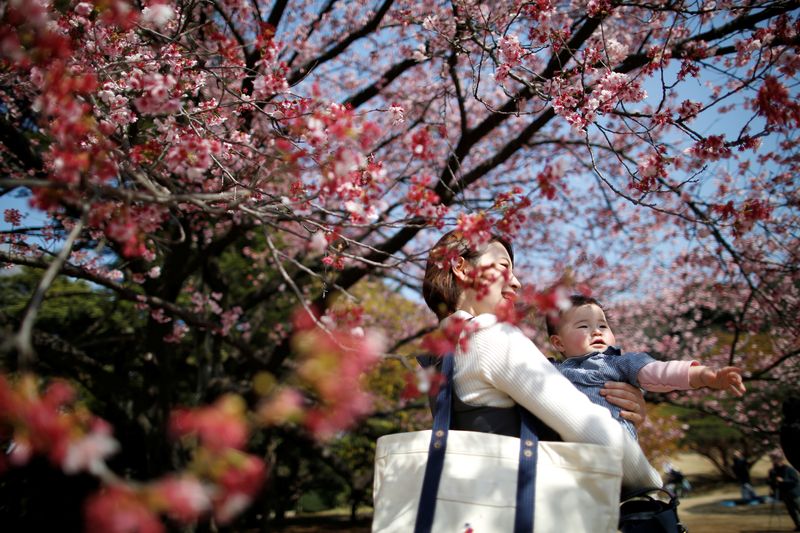By Tetsushi Kajimoto
TOKYO (Reuters) - Japan's government laid out a fresh plan on Friday to boost childcare over the coming three years to reverse the country's declining birth rate, a move that may lead to another big spending package and strain its already tattered finances.
Prime Minister Fumio Kishida has repeatedly vowed to double childcare-related spending but has steered clear of elaborating on details, which he said will firm up in June when the government publishes a mid-year policy roadmap.
Under the plan, the government will expand child allowances by scrapping means testing. It will also offer paid parental leave fully in workplaces, encouraging parents to have a double income.
Announcing the proposals, Masanobu Ogura, the minister in charge of childcare policy, said more needed to be done to help mothers back into the workplace.
"In Japan, two-income households are rising, but mothers tend to give up on their career while being forced into 'one-ope' childcare by taking on unpaid household work 5.5 times that of fathers," Ogura said.
"I can't say anything concrete now on the childcare budget," Ogura added.
Japan's government earmarked around 6.1 trillion yen ($45.74 billion) for this fiscal year to arrest the declining number of children and a senior ruling party lawmaker was quoted by media this week as demanding an additional 8 trillion yen to fund the new measures.
Economists questioned both how the package would be funded and whether it would be successful.
"A boost to child allowances could cost 2 trillion yen to 3 trillion yen. It sounds like the same old spending spree, which did not necessarily turn around the birthrate," said Takahide Kiuchi, a former central bank board member and now an economist at Nomura Research Institute.
"The government may end up issuing extra bonds, with the justification that education-purposed bonds should help future generations."
RECKLESS SPENDING
Finance Minister Shunichi Suzuki said on Friday Japan must come up with a "permanent source of revenue" to fund childcare policies, but voiced caution over the idea of issuing extra debt.
Ranil Salgado, the International Monetary Fund's Japan mission chief, urged Tokyo to target such financial incentives towards low-income households.
"Everyone acknowledges childcare support is important given Japan's need to boost the growth rate. But we still believe those measures could be, or any support, should be targeted," he told an online briefing on Friday.
Japan is among the world's fastest ageing societies, with the number of newborns falling below 800,000 for the first time, having peaked at 2.09 million in 1973 during the second baby boom.
The declining birth trend has been blamed for intensifying labour crunch and pushing down Japan's long-term growth potential.
Some analysts see the latest plan as a sign Kishida is trying to shore up support and gearing up to call a snap election in coming months, to solidify his standing within the ruling Liberal Democratic Party (LDP).
"Opposition parties also have no objection to boost childcare spending," said political analyst Atsuo Ito. "Both sides appear to join in a race to boost reckless spending."
($1 = 133.3500 yen)
